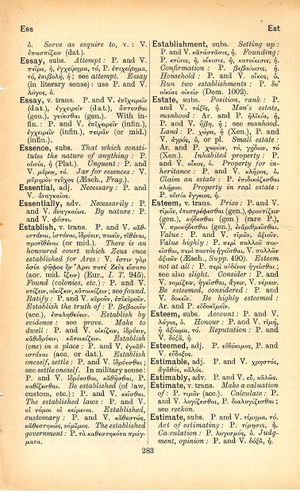essence: Difference between revisions
From LSJ
καὶ κεραμεὺς κεραμεῖ κοτέει καὶ τέκτονι τέκτων, καὶ πτωχὸς πτωχῷ φθονέει καὶ ἀοιδὸς ἀοιδῷ → and potter is ill-disposed to potter, and carpenter to carpenter, and the beggar is envious of the beggar, the singer of the singer
m (Text replacement - "<b class="b2">Frag.</b>" to "''Frag.''") |
m (Woodhouse1 replacement) |
||
| Line 1: | Line 1: | ||
{{Woodhouse1 | {{Woodhouse1 | ||
|Text=[[File:woodhouse_283.jpg|thumb|link={{filepath:woodhouse_283.jpg}}]] | |Text=[[File:woodhouse_283.jpg|thumb|link={{filepath:woodhouse_283.jpg}}]] | ||
===substantive=== | |||
[[that which constitutes the nature of anything]]: [[prose|P.]] [[οὐσία]]. ἡ ([[Plato]]). | |||
[[unguent]]: [[prose|P.]] and [[verse|V.]] [[μύρον]], τό. | |||
[[jar for essences]]: [[verse|V.]] [[μυρηρὸν τεῦχος]] ([[Aeschylus|Aesch.]], ''Fragment''). | |||
}} | }} | ||
Revision as of 08:57, 20 May 2020
English > Greek (Woodhouse)
substantive
that which constitutes the nature of anything: P. οὐσία. ἡ (Plato).
jar for essences: V. μυρηρὸν τεῦχος (Aesch., Fragment).

